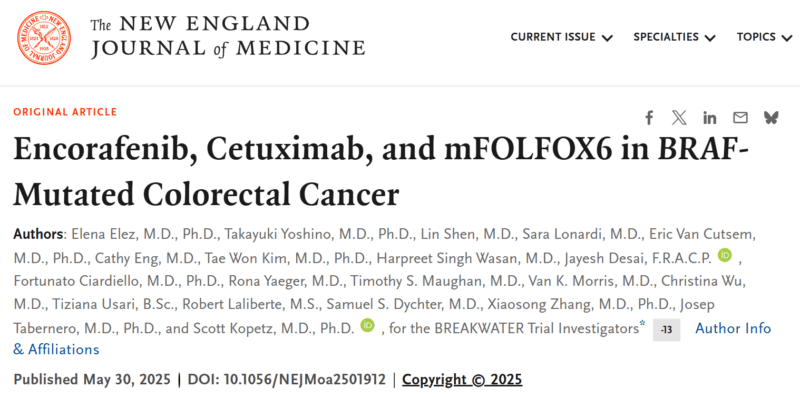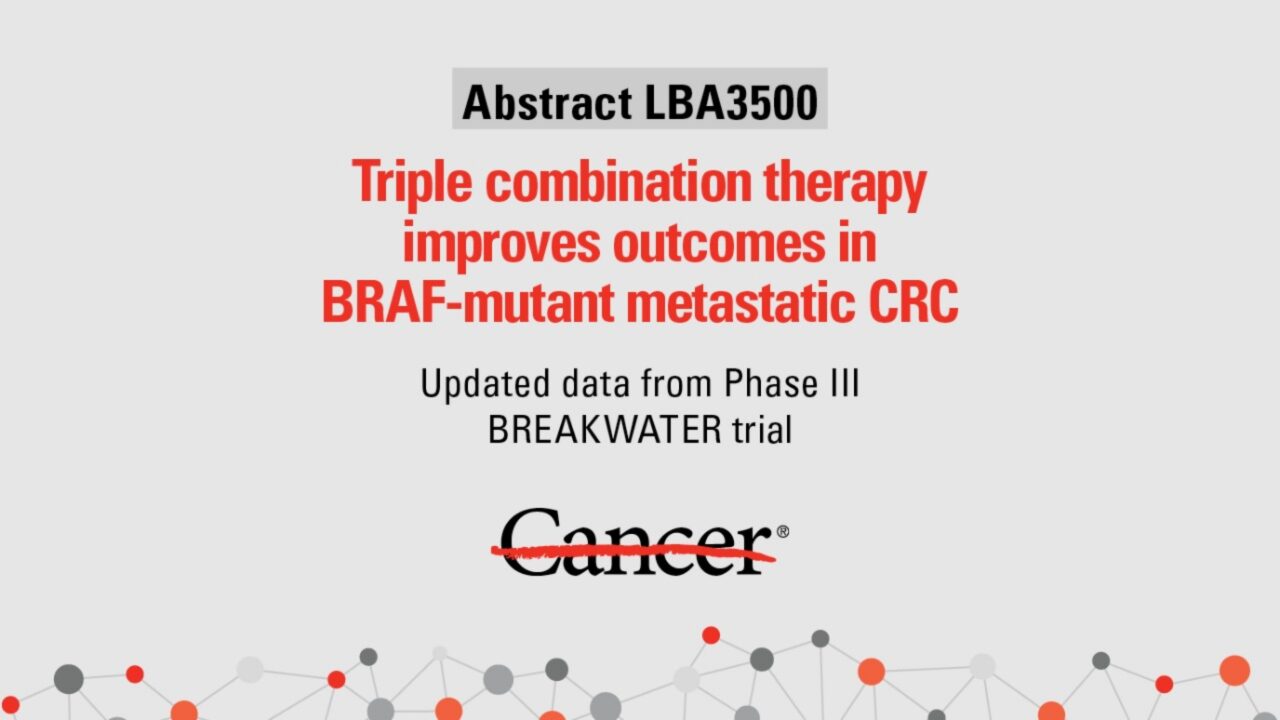- Approximately 8 to 12% of patients with colorectal cancer have BRAF mutations
- Treatment with the triplet combination of drugs – encorafenib, cetuximab and chemotherapy – helped patients live longer and kept cancer from progressing
- The Food and Drug Administration granted accelerated approval for this new combination in Dec. 2024
- Median overall survival was 30.3 months with the triplet therapy, compared to 15.1 months with standard treatment
ABSTRACT: LBA3500
First-line treatment with the triplet combination of encorafenib, cetuximab, and mFOLFOX6 significantly improved survival compared to the standard of care in patients with BRAF V600E-mutated metastatic colorectal cancer, according to new data from the Phase III BREAKWATER trial led by researchers from The University of Texas MD Anderson Cancer Center.
The findings, presented today at the 2025 American Society of Clinical Oncology (ASCO) Annual Meeting and published in the New England Journal of Medicine, demonstrated significantly longer progression-free survival (PFS) and overall survival (OS) compared to standard chemotherapy-based regimens. The median PFS was 12.8 months with the triplet combination compared to 7.1 months in the standard-of-care group, and the median OS was 30.3 months compared with 15.1 months, respectively.
Title: Encorafenib, Cetuximab, and mFOLFOX6 in BRAF-Mutated Colorectal Cancer
Authors: Elena Elez, Takayuki Yoshino, Lin Shen, Sara Lonardi, Eric Van Cutsem, Cathy Eng, Tae Won Kim, Harpreet Singh Wasan, Jayesh Desai, Fortunato Ciardiello, Rona Yaeger, Timothy S. Maughan, Van K. Morris, Christina Wu, Tiziana Usari, Robert Laliberte, Samuel S. Dychter, Xiaosong Zhang, Josep Tabernero, and Scott Kopetz

“The latest data from the BREAKWATER trial further confirms that targeting the BRAF V600E mutation up front, with encorafenib, cetuximab and mFOLFOX6, offers a clear survival advantage over standard chemotherapy alone. The combination reduced the risk of disease progression or death by 47% and cut the risk of death in half compared to standard care. This represents an unprecedented improvement for patients with this mutation,” said co-principal investigator Scott Kopetz, M.D., Ph.D., professor of Gastrointestinal Medical Oncology and associate vice president of Translational Integration at MD Anderson.

Scott Kopetz
Colorectal cancer affects more than 150,000 individuals annually in the U.S., according to the National Cancer Institute. BRAF mutations, present in approximately 8 to 12% of colorectal cancer cases, are associated with a distinct molecular subtype characterized by aggressive tumor biology, limited responsiveness to standard-of-care chemotherapy, and poor clinical outcomes, with median OS typically under 12 months.
Encorafenib and cetuximab are targeted therapies designed to counteract the activity of proteins that drive cancer progression when BRAF V600E mutations are present. Chemotherapy regimen mFOLFOX6 is commonly used in treating colorectal cancer. Standard treatments typically involve chemotherapy without targeted BRAF inhibition.
The safety data from this trial continues to show that the triplet therapy regimen caused Grade 3 or higher adverse events in more than half the patients, although the adverse events were largely reversible.
The trial reinforces the importance of routine molecular profiling to guide early targeted therapy selection for colorectal cancer patients. Similarly, a research team led by Kopetz was awarded a $23 million grant from Advance Research Projects Agency for Health (ARPA-H), a division of the U.S. Department of Health and Human Services, to advance innovative research to understand how colorectal cancer changes in response to treatment over time.
The researchers aim to collect tissue and blood samples from metastatic colorectal cancer patients, along with response data, over time in order to better understand and combat treatment resistance.
The study was sponsored by Pfizer Inc., and Kopetz disclosed consulting for Pfizer and receiving research funding from the company. A full list of collaborating authors and their disclosures can be found in the full paper here.
More posts featuring ASCO 2025.


